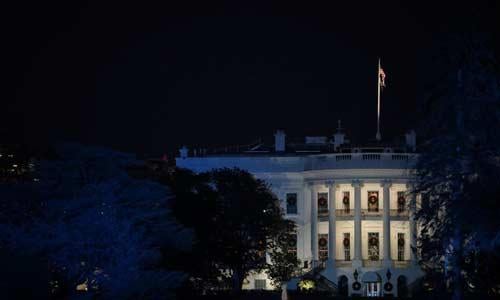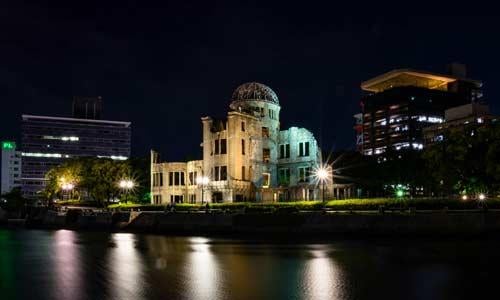US-China relations expert Dr. Gregory Kulacki discusses China’s nuclear weapons strategy and what it means for the Russian war in Ukraine.
In this episode
Colleen and Gregory discuss:
- China's nuclear arsenal
- China's plans to increase its arsenal
- China and US policy on nuclear weapons
Timing and cues
Opener (0:00-0:26)
Intro (0:26-1:56)
Interview part 1 (1:56-12:20)
Break (12:20-13:30)
Interview part 2 (13:30-24:04)
Throw (24:04-24:09)
Segment (24:09-27:30 )
Outro (27:30-29:00)
Credits
Clean Creatives segment: Cana Tagawa
Editing: Colleen MacDonald
Additional editing and music: Brian Middleton
Research and writing: Pamela Worth and Cana Tagawa
Executive producer: Rich Hayes
Host: Colleen MacDonald
Related content
Full transcript
Colleen: If you’re thinking about the Russian war in Ukraine… China may not be the first country that comes to mind. But in a world with nine nuclear-armed states, we cannot overlook any of them when one threatens global peace… Any act of war or aggression by a nuclear power implicates all other nuclear powers… Which you don’t really need me telling you is a pretty harrowing keep-you-up-at-night situation.
Instead of giving into the urge to just brush these curiosities––and fears––about nuclear policies under the rug, I decided to reach out to my colleague, Dr. Gregory Kulacki here at the Union of Concerned Scientists, an expert on US-China relations. He explained to me the key differences and implications in the United States and China’s nuclear policies, and how the US nuclear arsenal is what my niece would describe as “totally overboard.”
It's especially ironic to me that the prevalence of these weapons makes the world a much more dangerous place for us all instead of keeping us safe. Sometimes, when I dig deep into topics like this with my colleagues, what I learn keeps me up at night. But in this case Gregory assured me that there is more hope and cooperation than we know about just from watching the news. Keep listening if you, like me, want to understand how these nuclear policies impact our realities day to day, and what it means for the War in Ukraine.
Colleen: Gregory, welcome to the podcast.
Gregory: It's nice to be here.
Colleen: You know, as Russia's war on Ukraine continues, I wanted to check in with you on China's reaction to the war, their stance on nuclear weapons, whether this war has emboldened them with regard to Taiwan. The threat of using nuclear weapons has been raised by Putin. So I'd like to start there. How many nuclear weapons does China currently have?
Gregory: Well, the honest answer is that we don't know. But the best estimates available, say that they have around 350 warheads, compared to the 5,400 and some that the United States has.
Colleen: And do we know if they're actively building more nuclear weapons or if they are planning to?
Gregory: Well, again, the honest answer is we don't know. But the commander of the U.S. Strategic Command has told Congress, China's going to double the size of its arsenal, it's number of warheads, from 350 to 700 by 2027, and add another 300 by 2030.
Colleen: Why do we need so many nuclear weapons?
Gregory: We don't. I mean, plain and simple. It's just overkill. Tremendous overkill.
Colleen: Right. And what is China's motivation for building more?
Gregory: Well, we're not sure they're building more. One thing we are relatively sure about, because we've been able to see this from commercial satellite imagery, is that they are building new missile silos in the deserts of Western China. Some say up to about 300 of them. So why they're doing that is a complicated question. The head of the U.S. Strategic Command thinks they're doing it for aggressive reasons. Our Chinese colleagues, to the extent that they talk about it at all, say that there...it's really just a continuation of China's existing policy, and they just feel that they need a larger number in order to be able to convince the United States that no matter what the United States does first, they'll still have the ability to retaliate.
Colleen: And how has the US reacted to this?
Well, one thing that's going on is that the United States Strategic Command is pressing Congress to spend a lot more money on nuclear weapons than is necessary. And it's using I suppose a Chinese nuclear build-up in order to convince Congress to give it the money. And if you look carefully at the numbers, despite, you know, the significant increases we can expect in the size of China's nuclear arsenal over the next decade, the U.S. nuclear arsenal is so much larger, and so much more capable than the Chinese arsenal that there really is no need for Congress to spend more money to make it even larger.
Colleen: So Gregory, what type of weapons do they have?
Gregory: Well, they have air-launched, sea-launched, and land-based missiles that can carry nuclear warheads to targets in the United States or allied countries in Asia, U.S. allied countries in Asia, Japan, or Guam. They could also carry them to India and Southeast Asia.
Colleen: So they can pretty much reach any place on the planet.
Gregory: Yes, that's a fair thing to say.
Colleen: And they have the capability to easily launch their warheads.
Gregory: They don't think so. The bulk of their missiles that can reach the United States are land-based missiles that they ride around on trucks, and they have to move these trucks into position and then relatively quickly erect the missile and then launch it. They worry that U.S. conventional weapons, very precise conventional missiles can destroy Chinese nuclear missiles before they have a chance to launch them. So one of the reasons people speculate that they're building the silos in the desert is that the United States can't destroy those with conventional weapons. The United States would have to launch a massive nuclear first strike against China in order to destroy the missiles in those new silos.
Colleen: So I think I'm getting a picture of what their strategy is, correct me if I'm wrong, but it sounds like they're not necessarily saying that they are doing this because they wanna be the aggressor, but it's really that they feel that they need this as a deterrent?
Gregory: Well, it's a complicated question, because what China wants to be able to do, if it feels it's necessary, is to fight a large conventional war with the United States, and not worry that the United States will use nuclear weapons first. And the only way they can not worry that the United States will use nuclear weapons first, is to convince the United States that if they do, the United States will suffer retaliation. So in one sense, Chinese nuclear weapons enable them to be more aggressive with their conventional forces.
Colleen: So what is their stance or their policy on using nuclear weapons? Do they have a no-first-use policy?
Gregory: On the very first day of their or the very, you know, the first nuclear test in 1964, they committed to never use nuclear weapons first at any time under any circumstances. And they have repeated that commitment over and over again and still hold by it. Now the problem, of course, is the United States doesn't believe them.
Colleen: But if they say under any circumstances, doesn't that mean if somebody launched a nuclear weapon at them they wouldn't retaliate?
Gregory: That's a great question, Colleen, because one of the debates that's been going on in China since I'll say 2013 or so is whether or not if the Chinese had the ability to detect that a nuclear armed missile was coming towards them. Does that count as being attacked first? And there's still a debate going on about that. People in the foreign ministry have told us that, "No, that would be a violation of Chinese...to launch on warning of an attack would be a violation of China's no first use policy." But the Academy of Military Science who really kicked off this debate with a 10-year review of Chinese strategy that they do every year, every 10 years in 2013, they said they thought that launch on warning was not a violation of China's no-first-use policy.
Colleen: Semantics.
Gregory: Important semantics, though.
Colleen: Right. You know, I was thinking before we met is China more or less likely than the U.S. or Russia to, you know, "Go nuclear?" And our conversation here is saying to me that they are less likely to do that.
Gregory: I think that's correct. For one thing, China doesn't keep its missiles all revved up and ready to go like the United States and Russia do. They're off alert, so much off alert that if the rules of the new START agreement between the United States and Russia were applied to China, their total number of nuclear weapons would be zero. Because none of them are ready to go, ready to be launched. They keep the warheads and the missiles separate. And they train to mate them together at the time of launch after a first nuclear strike by another nuclear nation.
Colleen: So that strikes me as sensible in a world where we have nuclear weapons, because you would have more time to consider what's happening and what you're doing.
Gregory: That's right. And if you read Chinese military texts, they even say that China doesn't have to retaliate right away. They could suffer a nuclear attack and wait days before they decide when and where they're going to retaliate against that first strike. So traditionally, at least, China has kept a very sort of more reserved posture, nuclear posture.
Colleen: Once they build the silos, will that still be the case?
Gregory: The silos change things because the missiles in the silos are most likely going to have the warheads already mated to them. And there is some discussion that China is building, experimenting with building an early warning system to be able to detect U.S. launches or Russian launches towards China and or Indian launches towards China, I guess, or even a North Korean launch towards China, which is not out of the question, and be able to respond on warning. So China's policy may be changing. We just don't know.
Colleen: For our listeners who aren't up to speed on U.S. policy, vis a vis nuclear weapons, can you just run through what the U.S. policy is?
Gregory: The United States military believes you can fight and win a nuclear war. That they can use low-yield nuclear weapons, for example, to end a conventional conflict on favorable terms, and not be concerned about retaliation, because they can control the escalation of a nuclear war. From the beginning, the United States has seen nuclear weapons as a valid ordinary means of conducting war. It's just taking it to the next level. China, on the other hand, believes that the chance that anyone would be stupid enough to use nuclear weapons is very, very small. And so, they're really less worried about the possibility of a nuclear war and make less preparations for different kinds of scenarios of nuclear war than the United States does.
The United States will use nuclear weapons first. It won't adopt a no-first-use policy. And it looks like President Biden is not going to change that. And the United States is prepared to wage extended nuclear warfare. You know, they believe they can have a sort of back and forth with another major nuclear power, and that they'll, you know, they're prepared to prevail in the end. And one of the reasons we have such a large arsenal is because they have so many planned scenarios of this type of war and that type of war, if it goes to this stage, or that stage, or this stage, or that stage. They're prepared for everything, and they wanna be prepared for everything. So they wanna have different yields and different numbers and different types of launch vehicles, and they wanna have them deployed everywhere so they can be ready to be used in all kinds of different circumstances. It's actually quite complicated, American nuclear weapons use policy.
Colleen: Has China ever come close to launching a nuclear weapon?
Gregory: Well, maybe. There was a conflict between China and the old Soviet Union, over Zhenbao island in the northeast of China and the Far East of Russia in 1969. And the Chinese were very concerned that the Soviets were preparing to attack China with nuclear weapons. And they made preparations to launch an intermediate-range nuclear-armed missile. How far those preparations got, and whether they could have actually done it remains unclear.
Colleen: Right. And I guess if I asked the same of the U.S., I'm assuming the closest we've come would be the Cuban Missile Crisis.
Gregory: That's a good assumption, but it's actually not the closest. The closest we came was in March of 1955 in the Taiwan Straits crisis, when President Eisenhower was preparing to use nuclear weapons against the Communist Chinese to, in his mind, prevent a possible Chinese, Communist Chinese invasion of Taiwan.
Colleen: And how did we avoid that?
Gregory: Well, circumstance, serendipity. It turned out that as that crisis was heating up, and as the United States was making its preparations, and they had selected targets and, position, munitions, and authorized the use of these weapons, Eisenhower had authorized the use of these weapons and all, you know, everything was being prepared to take out Chinese airfields and to Chinese artillery emplacements which were bombarding the Taiwan held island or the Nationalist Chinese held island of Kinmen, which is very close to the Chinese coast, when all of that was going on, there was an international conference, the first conference of Asian and African nations was scheduled to be held in Bandung, Indonesia.
And the United States decided to wait until that conference was over, because they held out the hope that because the Communist Chinese had been invited to that conference, there was a chance that U.S. Asian allies could exercise a persuasive influence on the Chinese, and that war could be avoided. So it was the lucky scheduling of a landmark international conference that actually delayed the U.S. decision to use nuclear weapons, which in the end turned out to be enough time to open up dialogue with the Chinese that took the pressure off.
Colleen: Well, that's so interesting. I was hoping your answer was going to be immediately, really smart diplomacy, and negotiation, and conversation. And it sounds like having that extra time allowed for negotiation to happen. Which just gets back to what we were talking about a little while ago, which was having more time, not having that ability to just push the button is so important.
Gregory: That's exactly right. I mean, the importance of the time was not so much for U.S., China, and Communist China negotiations, but negotiations within the U.S. government. Eisenhower's military advisors were pressing him saying that the military situation was extremely dire, that China had an intention to take Taiwan. They were gonna be able to do it in a hurry just like they did in Korea. And if we didn't stop them, before they started, it was gonna go badly for the United States and for the Nationalist Chinese on Taiwan. And the extra month gave Eisenhower the time to question his own military advisors.
And the more he looked at the military situation, the more he discovered that that was not true. That the United States had more than enough conventional military resources to adequately handle the situation. And so, there were talks between the Chinese, the U.S, the Communist Chinese and the U.S. that opened up and went on for years. But when they broke down in 1958, the Communist Chinese started shelling the island again, but this time, Eisenhower didn't even consider using nuclear weapons, despite the fact that he was getting pressured by other members of the military to do that. He realized that he could just, you know, use relatively modest amounts of U.S. conventional military support to the Nationalist Chinese army to solve the problem. So time is actually very, very, very important for decision-makers.
Colleen: So China made a pledge to Ukraine about a decade ago that it would not use nuclear weapons against Ukraine, which is a non-nuclear country. I believe it's called a negative security assurance. So can you explain what that is and how that plays into the current situation?
Gregory: Well, actually, it's a positive security assurance. A negative it's assurances I won't do this. So we won't attack you with nuclear weapons, because you're a non-nuclear weapon state. That's a negative security assurance. A positive assurance, which is much more meaningful in this circumstances that if somebody else attacks you with nuclear weapons, we'll come to help you out or threatens to attack you with nuclear weapons, we'll come to help you out. That's a positive assurance, something I will positively do for you.
Colleen: So did I have that backwards then? They issued a positive security assurance?
Gregory: Well, they issued both...
Gregory: So they said, because you're a nuclear weapon state. And it wasn't just that they're a non-nuclear weapon state, it's that they gave up the nuclear weapons they inherited from the old Soviet Union. They surrendered them. They gave them back to, or they let Russia keep them. And because they did that, they became a non-nuclear weapons state. And when they did that, China said, "Okay, because you're a non-nuclear weapons state, we promise we will not use or threaten to use nuclear weapons against you." That's a negative security assurance. But China added something else, a positive assurance, which said that if somebody threatens to use nuclear weapons, or uses nuclear weapons against Ukraine, we will come to your aid.
Colleen: So where does that stand now?
Gregory: Well, China's violating its assurance. Putin clearly threatened to use nuclear weapons against Ukraine. And so, China owes Ukraine its support, which it is not giving to the Government of Ukraine. So it's not honoring that positive security assurance.
Colleen: And there isn't anything binding here. It's just a statement.
Gregory: Well, statements mean something. So if China doesn't honor its assurance here, why should we trust any of China's other assurances?
Colleen: Right.
Gregory: China will pay a cost for not honoring that positive security assurance to Ukraine.
Colleen: So I know many of us are wondering if the war on Ukraine will potentially motivate China to invade Taiwan. What are your thoughts on that?
Gregory: Well, China doesn't need any motivation. And I don't think it wants to invade Taiwan. China wants to avoid war at all costs really. China prepares for a war over Taiwan because it cannot allow Taiwan to become an independent state or it feels it cannot. So in order to prevent that China is prepared and preparing to fight a war to make sure that does not happen. But in the absence of a declaration from Taiwan of independence that is recognized by the United States and other countries, I think it's very unlikely that China will take military action, you know, aggressive military action, like invading Taiwan.
Colleen: So, what are President Biden's options for rebuilding and stabilizing relations with China?
Gregory: He has many options. He can initiate all kinds of constructive conversations on everything from climate, to health, to trade. And they could even have a constructive conversation on Taiwan and how to manage the problem, if there was a commitment by the United States to solve these problems it has with China through diplomacy instead of through threats, coercion, and enforce. So Biden has a lot of options.
Colleen: And you feel China is open to diplomacy.
Gregory: I think China is so discouraged now after decades of lack of progress that it's not listening anymore. And even if the United States were to have say, a change of heart and make some initial overtures, it would take a long time for the Chinese to believe the United States wasn't trying to deceive it, or manipulate it, and that its intentions were genuine. That's how bad the relationship has become sadly. I mean, if you think about it for a second, we learned from Bob Woodward, that the Chairman of the Joint Chief of Staff had to call China twice towards the end of the Trump administration to convince it that the United States was not preparing to launch a war. That's a pretty dramatic statement on how bad communications are.
Colleen: Gregory, have you seen anything happening that gives you hope?
Gregory: There's always hope. The most hopeful sign is that Asia, in general, the nations in Asia among themselves are far more oriented towards negotiation, cooperation, and consensus than their counterparts in the West. And so, you see, despite all of the tensions between China and the United States, the maintenance of constructive ties between China and its neighbors. That's not to say there aren't an awful lot of tensions, especially over sovereign disputes in the South China Sea, Taiwan, disputes between China and Japan over the Diaoyudao/Senkaku islands, but they managed those disagreements reasonably well. And so, Asians are keeping the peace in Asia. And absent some dramatic turn of events, I think you can expect them to be able to continue to keep the peace in Asia.
Colleen: Well, Gregory, thank you so much for joining me on the podcast. It's been great to check in with you and get your perspective on what's going on.
Gregory: It's been my pleasure.



